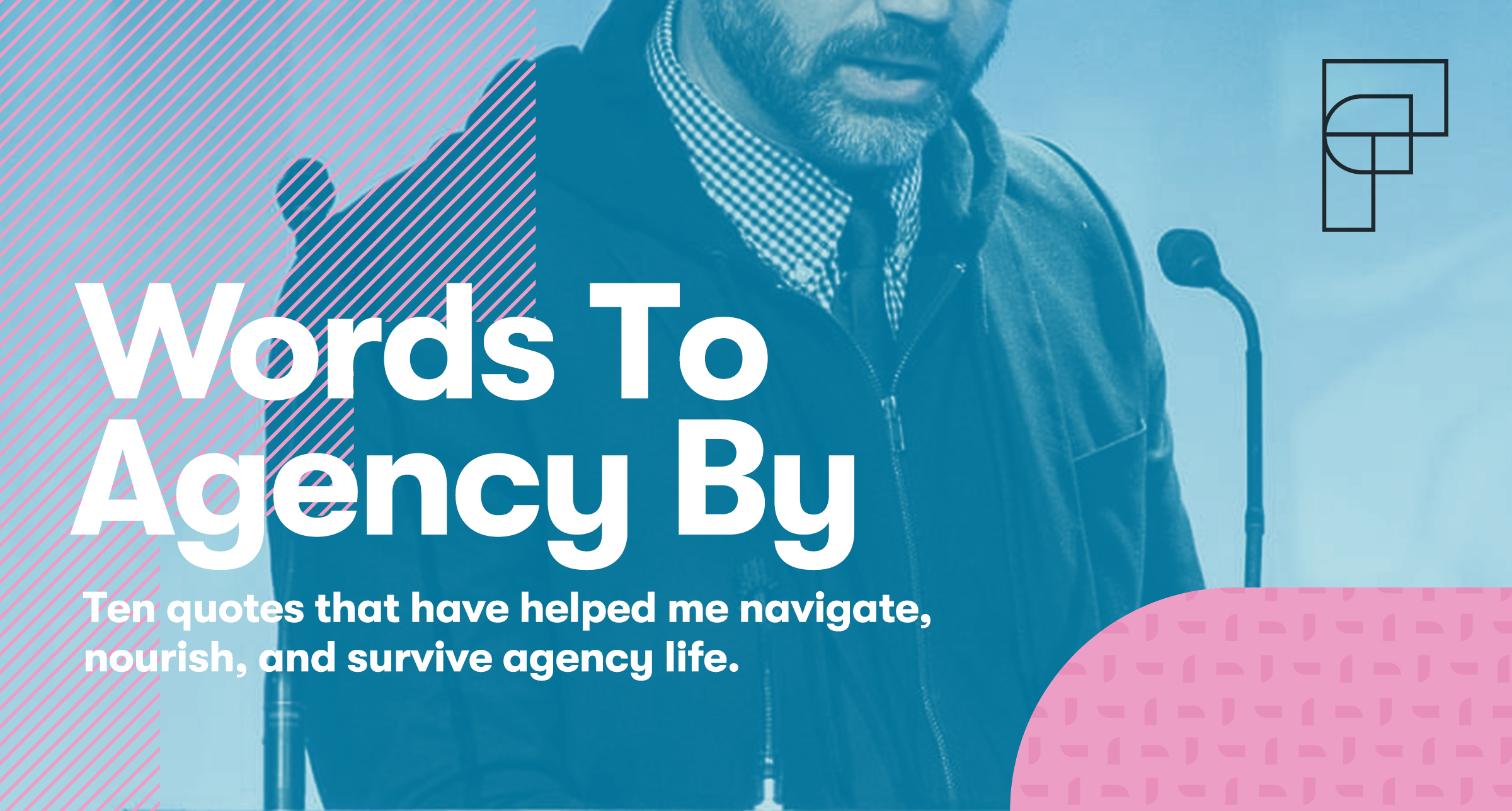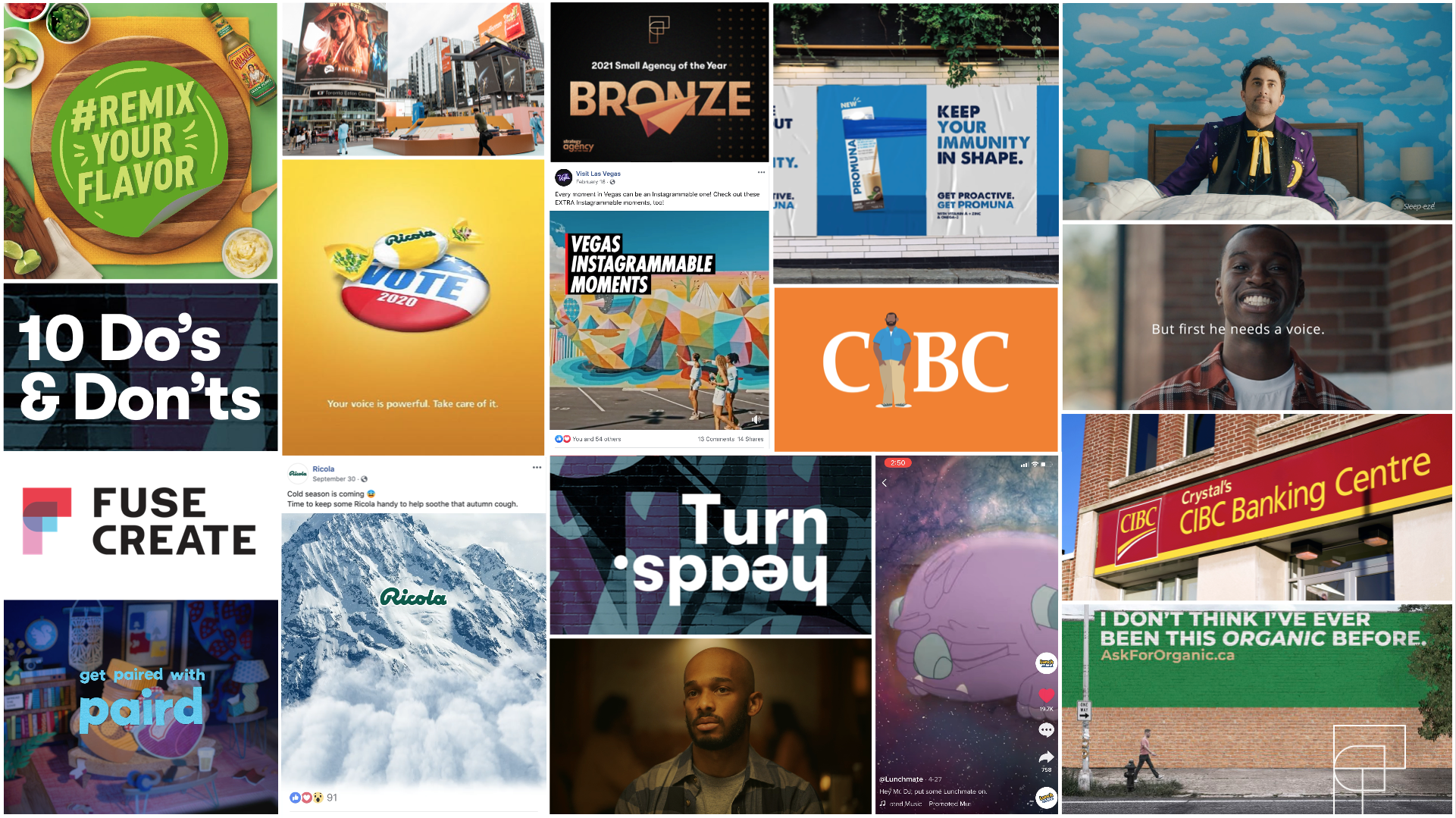
Ten Quotes To Help Navigate, Nourish, and Survive Agency Life
These are the words I live by within the agency, the words I agency by. And they have shaped my leadership style, the cultures I’ve helped build, and improved my probability of getting through the workday.

After 20+ years in this industry, I’ve learned that to create great work, effective leadership, and an infectious agency culture, it can feel like a process of trial and error; you win some, you lose some. And while you hope to let go of the errors and losses, you most definitely hold onto the wins.
Those wins have stayed with me throughout my agency life. Wins that have become a collection of my own musings and expressions, finding their way into Town Halls, interviews, pitches, creative team meetings, senior management off-sites, even within myself at times when I’ve needed a good gut check. And over that time, I’ve come to trust these “isms” as I call them.
They are the words I live by within the agency, the words I agency by. And they have shaped my leadership style, the cultures I’ve helped build, and improved my probability of getting through the workday. Maybe some of these wins will resonate with you. Maybe they’ll give you a new perspective or reinforce what you already believe in. Or maybe they’ll fall in the ‘lose’ column for you, and that’s ok. Either way, I hope they help, provoke thought, stir debate, or just maybe, give you a new set of words to agency by.
1. “It’s much easier to help shape one’s opinion than it is to change it.”
Pitching work to a client is nerve-wracking. You wonder if they’re going to like it. And worst of all, you wonder if they’ve already made up their mind before you’ve even gotten past the Agenda slide. Changing your client’s opinion is an uphill battle, and one that starts from the very bottom of the hill. And you don’t often win. Consequently, I’ve learned it’s much easier to help shape one’s opinion than it is to change it (and I’ve got the battle scars to prove it).
So, when it comes to pitching work, make sure you’re setting up your presentation in such a way that your audience is already nodding along before they even see the work – help shape their opinion. Make sure any brief details, strategic thinking, consumer insights, considerations, and any and all of their hole-poking questions have been answered up front, then present the work.
And ideally, you do actually present the work – help shape their opinion. Don’t just send it over for their review, you might as well send it straight to the top of the hill in that case! We as presenters bring the work to life. We fill in the gaps that final production can’t at this stage. It’s about conveying, not convincing. Sidebar: If your client ever needs to “run it up the flagpole” internally, always offer to be the runner – remember, they’re in a pair of loafers and you’re in a pair of Nikes.
——
2. “Take the work seriously, not yourself.”
There’s a lot at stake when it comes to the work we do for our clients. Money for one. Brand reputation. Not to mention our jobs. And doing what we do isn’t easy. Contrary to what our friends and family might believe when they pitch us their taglines and commercial ideas, being unassumingly persuasive is arduously hard work. So, we ought to take the work seriously. But this is advertising…
We’re not performing heart surgery here. But we are saving market share, repairing damaged sales, and/or preventing brand erosion – all super important, save-worthy causes in our line of business. And indeed, solving for those causes can be stressful, and it’s in those tense moments when not taking yourself too seriously can help ease what feels like an already rather onerous situation. So keep things light. Keep things grounded. And trust your craft. I think it was Bruce Springsteen who proclaimed, “Stress, what is it good for? Absolutely nothing.” – so while the problem might be serious, the moment doesn’t have to be.
Also, this is advertising! We can’t create laugh-out-loud content without a little levity. And we can’t break-through if we’re not breaking out of conformity. We have to allow ourselves to get silly. To be absurd. To step outside convention and the expected – to not take ourselves too seriously.
——
3. “I’d rather you give me your two cents than your two weeks.”
There is nothing more frustrating than losing good people. Well, save for the times when a resignation comes out of the blue and you wished you could have had the opportunity to try and not lose them. That’s why I always tell my teams “I’d rather you give me your two cents than your two weeks.”
I’d much rather hear that an employee is unhappy, unfulfilled, or getting that seven-year itch, than hear that they’re leaving. In that way, I can try and intervene, come up with solutions, advocate for their wants and needs (within or outside the agency), lend an ear and understand their situation before any decisions are made. No one should ever feel like their job is at stake, when they’re only trying to make their job better; leaders need to be listeners, and it would be a mistake to think otherwise.
Employees should feel like they can cash in on their two cents. To get the counsel they need and feel safe, supported and respected in doing so, no matter what the outcome. We should always want the best for our employees, even if the best means conceivably, accepting their two weeks.
——
4. “The creative department might come up with the idea, but it’s the agency who champions it.”
As an agency, we’re all agents of great work and stewards of creativity. We have to believe that. We all have to believe that we each have a share in the success of the work, no matter how small a role or how far down the creative process. And I don’t just mean those in the creative department. On the contrary. I mean everyone, from Account people, to Project Managers, to Finance; everyone should feel a proud sense of creative ownership.
Less often than we’d like to admit, great work doesn’t sell itself. Clients need to understand why it’s great but more significantly, believe that it is. That belief builds with each member of the team espousing their own belief, passion, and support for the creative. No one should ever feel like they can’t impact the work (and if that’s the case, it’s the agency’s culture that might be in need of some championing).
So, while it might be agents from within the Creative department who come up with the idea, it’s the agency as a whole who is entrusted to support it, believe in it, and champion it.
——
5. “Nothing sells like conviction.”
I love presenting. There’s no greater feeling (arguably) than walking out of a presentation with heads nodding, congratulatory thumbs up all around, and a piece of work you desperately want to bring to life, given the green light.
The art of the pitch is just that – an art. It takes time, thinking, strategy, delivery, and execution. It takes rehearsals, practice, rounds of revisions, and a coordinated team effort. It takes all that elbow grease to put together an effective pitch, plus one other thing: conviction. And if you ask me, nothing sells like conviction.
That’s why I always want those closest to the work to present it. It’s their baby. Their blood, sweat, and tears. And their excitement, want, and impassioned belief in the idea will come through in spades. That unmistakable look in their eye, the tone of their voice, and their body language just oozes authenticity, and persuasion.
Nothing can replace passion for an idea, not drama, not rehearsals, not a Keynote design. In a Presentation course I teach at the Miami ad Idea School, within the 105-slide deck, only one slide is repeated – can you guess which four words are on that slide? Nothing sells like conviction.
——
6. “Do great work, with great people, for great people.”
It’s a simple formula I’ve come to depend on to evaluate my happiness at any agency.
To me, great work fills you with pride. It’s work that’s smart. That makes you think or feel something. That’s portfolio-worthy, if not fridge-worthy. Work that works (see #10), and work that wins awards, but unintentionally so. If I can do that, I’m happy.
And working with great people means just that. Maybe you think they’re great because they’re collaborative, or have integrity, or have your back, or are just good peeps (meaning all of the above). With all the hours we spend together – demanding, pressure-packed, high-stake hours – you might as well share them with people you respect and enjoy. Of course, we’re not always going to see eye to eye, but great people stand shoulder to shoulder, and rise above, together. If I can work with those people, I’m happy.
And, finally, when I say, “for great people,” I’m referring to our clients. Yes, great in the sense of all the virtues of great co-workers, but also great in the sense of their perspective on the client/agency relationship. Great clients want a partner, not a vendor. They trust their agency and value creativity. They can take their client hat off when need be. And they are challenging yet forgiving. If I can work for that type of client, I’m happy.
I always say if I can do great work, with great people, for great people, you guessed it, I’m happy.
——
7. “Decide with your brain, follow through with your heart.”
Letting people go is one of the toughest parts of this business (letting good people go is even tougher). It’s a business decision that often stares us right in the face, yet we oftentimes can’t see it. Or we simply don’t want to. Which is why in those moments, as hard and as remorseful as they can be, making the decision with your brain is a must.
You know it’s the right decision, for the agency and more often than not the person being let go. So, it’s important to act fast, and to not let a potentially bad situation get worse, for both parties involved. However, while you decide with your brain, the trick is to follow through with your heart.
The decision might seem unkind or unfair, but the follow through doesn’t have to be. So, use empathy, understanding, and when in doubt, use the golden rule when delivering the news. Be sincere, show compassion, and lend an ear. It’s never personal, but it’s still a person you’re talking to. So keep that in mind, and more importantly, keep that in your heart.
——
8. “Awards are the by-product of culture, which is the product of its people.”
Any successful agency owes its success to its people. After all, an agency’s output is a direct result of its people’s input. But more than that, there is a positive correlation between an agency’s people and its culture. That is to say, when you have talented, smart, ego-less people within your agency (i.e., Possibilitarians), your culture will thrive. And that’s important, since an agency’s culture has a causal relationship with its awards count.
When you develop a culture of creativity, the drive for great work – award-winning work – is embedded in everyone. It’s not individualistic. Therefore, you greater your chances of great work when that standard, drive, and expectation saturates the agency. Your culture is the work, where everyone is on board, working towards the same goal.
When you start with your people, who establish the culture, which yields great work… the awards will follow.
——
9. “Account people; get your clients to love you.”
Account people are the agency’s gatekeepers. They hold the key to great work because they often hold the strongest relationship with the client. It’s the Account person the client calls first with an ask, an update, or an issue. Yes, members of the creative team and senior management also forge client relationships but it’s the Account Lead who, well, leads the account.
With more and more clients procuring a roster of agencies to perform project-based work, you want to be the agency they call. And to put it plainly, they’ll call the agency they love – or more pointedly, the Account Lead they love. That’s why I simply say to Account people; get your clients to love you.
They might love you because you’re smart. Fast. Fun. Because you feed them great insights. Or because you can get them into all the best restaurants without a reservation. Whatever the reason, if they love you, they’ll turn to you. They’ll trust you. They’ll lean on you as their right-hand. And they’ll call you, first.
Those mop-tops from Liverpool were no dummies; love is all you need.
——
10. “Work that works.”
Clients come to creative shops for creative solutions to their marketing problems. And whether the creative is to help solve an awareness issue, a perception change, a lack of buzz, or to simply drive sales, it’s our job to uncover a human truth and then message that truth in a compelling, relatable, and memorable way. It’s literally our job.
The work has to work. It has to deliver on our clients’ briefs and over-deliver on their metrics. Otherwise, why come back, right? Sidebar: Never rest on your retainer laurels. That should be the goal, not awards. Woah, woah, woah! Now before you slam the lid down on your laptop in abhorrence, hear me out; awards are an eventuality of work that works because more often than not, great work makes a great impression. So, if you’ve managed to blow the metrics out of the water, you’re likely to blow the socks off the judges too.
As someone once said, ‘You’re only as good as your last job’ – so make sure your last job works.
There you have it. Ten thoughts, reminders, and tips to help you navigate, nourish, and survive agency life. Navigate clients, dismissals, and pitches. Nourish your agency and team. And survive long days, long meetings, and hopefully a long career. They have served me well, and I hope they too become words to agency by for you.



